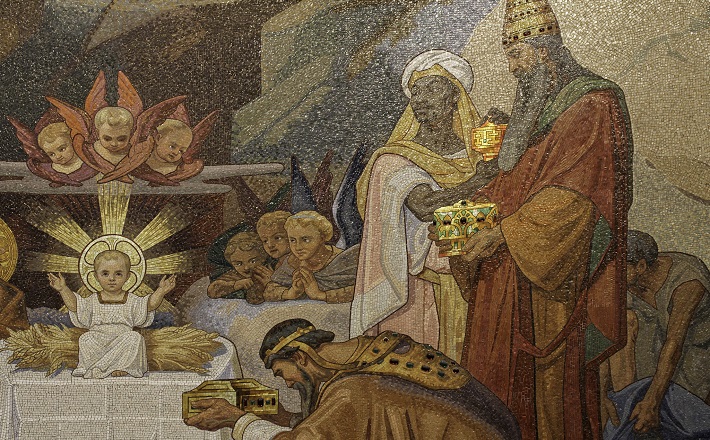Commentary on Ephesians 3:1-12
This passage is, to a large degree, a reflection on Paul’s unique role in the church.
However, its theological riches do not simply address one historical figure, even one of Paul’s stature. Nor does this text only address those who, like Paul, find themselves called to be preachers. It also serves as a profound meditation on what it means for the church to be entrusted with the message and the ministry of the gospel. In this time of the Epiphany, we hear in this text that God’s revelation in Christ has made all the difference in, and to, the world.
Ephesians 3:1 begins with a crucial backwards look (“This is the reason … ”). The preceding verse said that the readers have been joined into God’s dwelling place. The church is called to be the community where the world still encounters God in human lives. What does that look like? Paul is described in verse 1 as a “prisoner of Christ,” which may be a usefully ambiguous phrase. It may mean a prisoner “for” Christ” (NRSV), though it could also mean “captured by Christ.” Perhaps we need to hear both possibilities. Though the former may be an unlikely experience for many of us, the latter is a provocative description of what it means to be the church, caught by God’s grace.
In verse 2, the NRSV speaks of a “commission.” A better translation here would be “stewardship” (New English Translation). The thought is not that God graciously gave Paul a position of authority (i.e., “commissioning” him), but that God gave Paul the role of being a servant of grace. God has placed the treasure of the gospel into our hands as its stewards. Being good stewards means, as verse 2 indicates, that this stewardship is for the sake of others, and so we exercise this stewardship of God’s grace by giving it away with bold freedom, through our words and through our lives.
That stewardship of God’s grace also involves living out the “mystery” (verse 3; see comments about the meaning of “mystery” in last week’s exegesis of Ephesians 1:3-14). This mention of the “mystery” looks back to 1:9-10, and God’s intention to bring all things together in Christ. The church is called to be both a promise and a foretaste of that final reconciliation. The gospel has real (and sometimes difficult) social implications, as old cultural assumptions are dismantled. For Ephesians, the crucial divide that has been healed was between Jews and Gentiles. In our setting, there is no shortage of ways in which the “mystery” of the gospel calls us to reconciliation between divisions of race, culture, poverty, and sexuality. The church is called to live out that reconciling mystery with the strangers on our streets, and at our borders, and in all the desperate places of the world.
It may be worth noticing that this text doesn’t give any hint of how serious the disagreement about Jew / Gentile fellowship had been in the early church. The author looks back and says that the unity of the church in Christ was revealed not just to Paul, but to all the apostles, despite the disagreements reflected, for example, in Galatians. There is something hopeful here. Time gives a perspective that is difficult to attain in the disagreements of the present moment. The text reflects on what had been a controversial issue and sees that the church is profoundly one, despite those earlier disagreements. We can hope and pray the same will be true one day about all those things that currently cause division in the church.
This mystery of God’s grace is further described as the “boundless riches of Christ” (verse 8). The language used here indicates not simply that grace is abundant, but that these riches in Christ are incomprehensible. If we think we’ve understood God’s grace, we’ve just been looking at an idol of our own imagination. The wisdom of God is “many-sided” (verse 10; NRSV “in its rich variety”) like a gem with countless facets, sparking new light each way it is turned, so that not only are Jews and Gentiles brought together in Christ, but all divisions will be healed.
Verse 10 contains one of those breathtaking statements about the mission of the church that are part of Ephesians. Here, the purpose of the church is to make this wisdom of God known to the “rulers and authorities in the heavenly places.” These are the powers that many believed threatened the world, powers that might be visible in political and social dynamics but that had a reality which was more than human. We might see such powers today in the form of racism, perpetual poverty, oppressive political and economic structures, or the ways in which all systems are bent in favor of the few. In the face of such realities, the church is not called to survive, or to increase membership, or to make people feel better. It is called to be the sign, promise, and embodiment of what God intends for the whole world, and to do so in the face of, and in witness to, the opposing powers of the world. The church is called to be a living declaration that the hostile powers cannot stand; their final defeat is assured.
Perhaps, though, even this fails to grasp the vision of Ephesians. The proclamation of the gospel brings reconciliation; that is the message throughout Ephesians. The claim seems to be, therefore, that through the church, these powers of the world will be brought back into their proper role, their right relationship to God, and thus also to the rest of the world. The church hopes not for destruction, but for transformation and redemption on the widest scale.
In an ancient context in which the church would hardly have measured as a blip in a demographic study, Ephesians sees the church at the center of what God is doing, and this vision of the church’s mission has personal, social, and even cosmic dimensions. How does such a mission statement compare to your congregation’s?


January 6, 2016